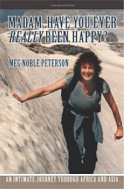Nowadays young people ask me why on earth I got married so young “back then.” That’s easy. Sex. We were like most couples in the 1950’s. Young naive virgins married to World War II veterans who seemed far older and wiser. These men simply wanted to come home to normalcy, start a family, and move up the professional ladder. Trial marriage or living together was for the Bohemians of yore or people who didn’t want to take responsibility, we rationalized. And having babies “out of wedlock,” as the biblical phrase goes, was anathema. Just look what they did to Ingrid Bergman! I have vivid memories of girls in my college class who “got into trouble,” as the euphemism goes, and were sent away for an extended vacation. That didn’t fool any of us. They had their babies and put them up for adoption. The result was heartache all around. Sometimes this “mistake” led to a hasty marriage, and most of the time the marriage was short and stormy. Sounds barbaric now, doesn’t it? Those were the days before The Pill, which arrived in the early 60’s and caused a seismic shift in attitude and behavior.
Ah, the expectations we had as women in the ‘40’s and ‘50’s. The glowing pictures painted by the commercials: diamonds are forever. So is the picket fence and the faithful daddy returning from his commute or his six-day a week job to reign over a dinner where obedient children sat and listened. And every day Mother cooked steaming stews and roasts followed by a variety of Jello desserts.
The books we were given to reinforce this ideal were just so much rubbish: Sex manuals pushing the goal of simultaneous orgasm while the earth moved with every coupling, causing young marrieds untold backaches and bruised egos in the pursuit of the near-impossible; magazines touting miracle household cleansers and waxes that made you feel like a sloth if you didn’t keep up the glowing appearance, the House Beautiful image; and neatly dressed, perfectly coiffed wives meeting their husband at the door, children clustered around, the whole family catering to Daddy’s every whim in order to assure domestic bliss. You can just picture the slippers by the chair put there by Ira Levin’s idealized Stepford wife. Bull, we were thinking, but nobody talked like that. Anybody with an ounce of sense and a pair of eyes could see through it. And, I might add, it put a lot of pressure on “Daddy” to be perfect, a good provider, and somewhat omniscient. He was looked to for answers, opinions, and wisdom. I can assure you, he didn’t like the picture, either.
Even those in higher education fed into the idea of home and hearth. I sometimes wonder why they educated women and tantalized them with lofty possibilities. Not that education doesn’t enrich life across the board, or that marriage and motherhood are to be disparaged. But how about a few years to find out who you are and who your spouse is before taking the leap?
In my senior year I went to my political science advisor, Dr. Bishop, to apply for a spot in the public administration program at the Maxwell Graduate School. I have to admit that I wasn’t really turned on by public administration, but I would have been the first woman to be admitted to the prestigious program and thought that it would be a better way to save the world than studying art, music, and writing. How wrong that turned out to be! Dr. Bishop looked at me, incredulously, and said, “Miss Noble, you’re pretty and smart and would make someone a wonderful wife. Why don’t you just get married?” As if marriage was the easy way out. And for many, considering the labor market for women in the professions at that time, it was just that.
On the other hand, my Phi Beta Kappa advisor, Dr. Williams, who, some months later, was instrumental in getting me a scholarship at the University of Minnesota for graduate study in political theory, said, when he found out I was getting married and postponing a promising career to, as he so delicately put it, ‘placate my raging hormones,’ “I’ll never recommend you, again, Miss Noble. Once you get that MRS degree, you’re an intellectual liability.” A pretty devastating indictment for any young woman to receive. For years I had a Newsweek cover tacked to my bulletin board, showing a large diaper pin and a Phi Beta Kappa key superimposed on the silhouette of a woman. This dilemma is something few present-day women have to face.
The succession of babies came within the next seven years and it wasn’t until the 1960’s that I had time to come up for air and find out what momentous changes had been taking place in the outside world, nationally and internationally, during my “confinement.”
For those ten years Glen and I had been involved in local government and passionate about civic reform…he as a city manager and I in various other capacities such as volunteer advertising manager for a weekly newspaper in Clarksburg, West Virginia, that was instrumental in overthrowing a corrupt regime and replacing it with an elected non-partisan city council. The times were exciting and challenging on a local level and the remuneration for my hard work was personal satisfaction. That’s the way it was for most women in those days. We were supported and we were willing helpmates. And the changes came slowly, after women realized that this ideal marriage might not last forever and they might just have to earn a living one day.

